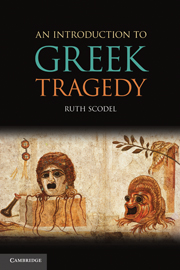13 - Tragic Moments
Published online by Cambridge University Press: 05 June 2012
Summary
COMPARING THE TRAGEDIANS
How can we usefully compare the tragedians without slipping into The Story? There are significant differences in their individual styles – in the language of their dialogue, in their songs, and in their dramatic practice – and Greek tragedy did have a history, even though we do not have enough knowledge to reconstruct it in any detail. Neither Sophocles nor Euripides (as far as we know) composed very long songs like the parodos of Agamemnon, for example. Aeschylus seems to have preferred “simple” plots, in which there is a single source of dramatic action and the focus does not change. All three tragedians composed tragedies of this kind, such as Sophocles' Oedipus Rex and Philoctetes, or Euripides' Medea and Bacchae, but Sophocles also wrote tragedies like Antigone, where the center moves from Antigone to Creon, while Euripides wrote plays like Andromache and Orestes, which radically change direction.
There are also similarities. Euripides' Hippolytus and Sophocles' Women of Trachis have similar structures, in which a woman who is the initial focus of audience sympathy causes the suffering and death of a man who becomes the center of the last part of the play, but the two characters have no direct contact. One may have influenced the other, but such structures may have been common. The tragedians' interactions with each other were complex. Euripides used the deus ex machina frequently. In the surviving plays of Sophocles, the device is used only once, in Philoctetes.
- Type
- Chapter
- Information
- An Introduction to Greek Tragedy , pp. 186 - 196Publisher: Cambridge University PressPrint publication year: 2010



